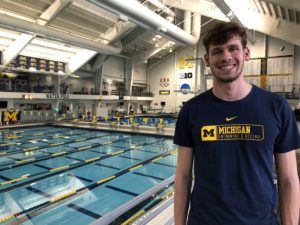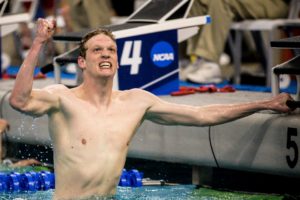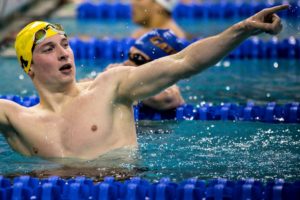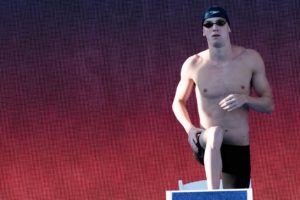We’ll be previewing the top 12 men’s and women’s programs for the 2019-2020 season – stay tuned to our College Swimming Previews channel to catch all 24. Can’t get enough college swimming news? Check out the College Preview issue of SwimSwam Magazine for more in-depth college swimming coverage, including a bird’s-eye view of the flood of coaching changes and our ever-popular rankings of the top 50 individual swimmers in college swimming.
#5 MICHIGAN WOLVERINES
Key Losses: Mokhtar Al-Yamani (1 NCAA relay)
Key Additions: River Wright (MA – multi), Cam Peel (MI – sprint free), Andrew Trepanier (MN – sprint free), Noah Yarian (IN – back), Danny Berlitz (PA – distance), Donald Scott (TX – sprint free/breast), Kevin Bradley (CT – diving), Nicholas Leavell (CA – diving)
GRADING CRITERIA
We’re unveiling a new, more data-based grading criteria in this year’s series. Our grades this year are based on ‘projected returning points’, a stat of our own making. We started with our already-compiled “no senior returning points” (see here and here), which is effectively a rescoring of 2019 NCAAs with seniors removed and underclassmen moved up to fill those gaps. In addition, we manually filtered out points from known redshirts and swimmers turning pro early, while manually adjusting points for outgoing and incoming transfers and adding in projected points for incoming freshmen with NCAA scoring times, as well as athletes returning from injury or redshirts who are very likely NCAA scorers.
Since we only profile the top 12 teams in this format, our grades are designed with that range in mind. In the grand scheme of college swimming and compared to all other college programs, top 12 NCAA programs would pretty much all grade well across the board. But in the interest of making these previews informative, our grading scale is tough – designed to show the tiers between the good stroke groups, the great ones, and the 2015 Texas fly group types.
- 5 star (★★★★★) – a rare, elite NCAA group projected to score 25+ points per event
- 4 star (★★★★) – a very, very good NCAA group projected to score 15-24 points per event
- 3 star (★★★) – a good NCAA group projected to score 5-14 points per event
- 2 star (★★) – a solid NCAA group projected to score 1-4 points per event
- 1 star (★) – an NCAA group that is projected to score no points per event, though that doesn’t mean it’s without potential scorers – they’ll just need to leapfrog some swimmers ahead of them to do it
We’ll grade each event discipline: sprint free (which we define to include all the relay-distance freestyle events, so 50, 100 and 200), distance free, IM, breaststroke, backstroke, butterfly and diving. Bear in mind that our grades and painstaking scoring formula attempts to take into account all factors, but is still unable to perfectly predict the future. Use these grades as a jumping-off point for discussion, rather than a reason to be angry.
2018-2019 LOOKBACK
Despite only scoring in two relays, the 400 free relay (16th) and the 800 free relay (14th), the Michigan Wolverines came through with big individual performances like Felix Auboeck‘s NCAA title in the mile, Miles Smachlo‘s third place finish in the 100 fly, and a smattering of scoring successes in grueling events like the 500 free, 400 IM, and 200 breast.
The Wolverines went 7-1 in the regular season, including a rout of then-#14 Ohio State in a B1G rivalry match-up. Their sole dual meet defeat came at the hands of the Indiana Hoosiers, who would go on to win the 2019 B1G conference title and then place third overall at NCAAs. IU was the clear top team in the conference both at B1Gs and at NCAAs, finishing over 200 points ahead of #2 Michigan at B1Gs this past season after the margin was a mere 40 points in IU’s favor in 2018.
With Michigan bringing back all but one NCAA relay leg (Mokhtar Al-Yamani on the 800 free relay), and IU losing huge names like 3x NCAA champion breaststroker Ian Finnerty, 2019 NCAA 100 fly champion Vini Lanza, 2019 NCAA runner-up Zach Apple, and eight-time All-American diver James Connor, the tide is turning back in Michigan’s favor.
The biggest off-season update from the Michigan roster has to be Charlie Swanson‘s win at the 2019 Pan Am Games. There, he clocked a 4:11.46 to take gold in the 400m IM, which cemented him as the second-best American in the event for the entire 2018-19 season.
SPRINT FREE: ★★
Sprint free killed Michigan’s top 10 hopes at last year’s NCAA championships, where they only picked up two points in the 400 free relay with a 16th place finish. They missed scoring altogether in the 200 free relay, and top sprinter Gus Borges was the only Michigan scorer out of the 50, 100, and 200 free with a B final appearance in the 50 free.

Gus Borges (Photo: University of Michigan)
In the 400 free relay, Michigan’s quartet included two swimmers who had not long before swam in the 200 breast final, Swanson and Tommy Cope, and both also swam in the relay in prelims. The fourth swimmer was Miles Smachlo, who surged to a third-place finish in the 100 fly on day three of the meet but tanked the 200 fly and touched 35th out of 40th. For the team they pieced together, it was actually quite impressive they were able to score that 400 free relay (the 200 breast to 400 free relay combo isn’t a very common double, let alone one done in both prelims and finals).
Luckily, any prayers for more sprinters from Michigan faithful have been answered. Cam Peel is the big get here, coming in already under 20 in the 50 free (19.86), while he’s also 43.9 in the 100 and 1:38.6 in the 200. He became the first swimmer in Michigan high school history to break 20 seconds in the 50 free in March, where he also dropped a hammer 19.0 relay split. He’s almost guaranteed to be on at least the 200 free relay with that kind of raw speed already, and he could quickly develop into another great relay leg in his freshman year.
Past Peel, there are several potential relay legs in Andrew Trepanier (20.1/44.2), River Wright (20.3/44.2/1:37.6), Parker Hughes (20.6/44.9), and Donald Scott (45.2/1:36.5). Louisville transfer Spencer Carl took a redshirt season last year, but his 1:36.3 best from high school is intriguing.
As for the 200 free and 800 free relay, Al-Yamani is the loss there, but Patrick Callan was 1:33.52 in early 2018 before his freshman year, and he was 1:34.4 at NCAAs last year, about 1.5 seconds off of scoring (though his best isn’t far off scoring level).
DISTANCE FREE: ★★★★
Felix Auboeck had one of the most impressive turnarounds in recent memory at the 2019 NCAA Champs, where he started off with a disastrous 500 free (going 4:18.40 to place 35th after finishing 2nd at 2018 NCAAs and breaking 4:10 to win 2019 B1Gs) and a mediocre 200 free (1:35.13 and missing the finals after he scored in 2017 and 2018 and has been 1:33-low). Plenty of great swimmers might finish off a bad meet with a bad last individual event, but Auboeck re-set and took on the 1650 free on the final day of the meet with a new fire.

Felix Auboeck (photo: Jack Spitser)
There, he not only won the NCAA title, but he clocked a 14:23.09 to rattle the NCAA record and win by over four seconds. Should he come back in that kind of form for the whole meet (like he has done in his freshman and sophomore campaigns), Auboeck is a title threat in the 500 free and mile and a scoring threat in the 200 free.
This is one of Michigan’s big strengths — they also return Ricardo Vargas, who finished fourth in the 500 free last year and finished top 8 in both the 500 and mile as a freshman in 2018. Those two could feasibly go top 5 in both distance free races, and even if they got 7th and 8th in the A finals of each race, that’s 46 points total.
Patrick Callan was 10th in the 500 last year, and junior Will Roberts is, at the least, a great conference scorer at 4:18.0/14:54.7 in the 500/mile.
A couple rookies to watch out for: Danny Berlitz at 4:24.0/15:23 and Christian Farricker at 4:25.1 in the 500.
BACKSTROKE: ★
A glaring hole in the Michigan lineup is backstroke, and despite Smachlo’s obvious speed in fly, Michigan’s dearth of sprint specialists (especially in back) did not do any favors for their medley relays. Neither medley scored at NCAAs.
Alex King absolutely stepped up in his sophomore year, to be sure. He missed the B1G team as a freshman, but last year dropped a 46.38 to place 5th in the 100 back at B1Gs, which helped make his case for the medley relay backstroke spot, which he raced at NCAAs. He was the only sub-47 backstroker on the roster last year, though, and 1:41.7 200 backstroker Kai Williams just graduated, leaving a hole at that distance, too.
There is some speed from the rookie class with Noah Yarian and River Wright both being 47.6 in the 100 back, while Yarian is also 22.2 in the 50 which would make him competitive for the 200 medley spot. Nonetheless, this is still not looking like a scoring discipline for Michigan this year.
BREASTSTROKE: ★★★
Though they had zero scorers in the 100 breast, Michigan returns two very capable breaststrokers who lean more to the 200: Charlie Swanson and Tommy Cope. Swanson won the B final in the 200 breast at NCAAs last year (1:52.09), with Cope touching 11th overall (1:52.91) but going 1:52.76 in prelims. With three A-finalists graduating after NCAAs (Andrew Seliskar, Ian Finnerty, James Guest), and no incoming freshmen under 1:54 in yards, the Wolverines have a great shot at getting two men into the A final in the 200.

Tommy Cope (photo: Jack Spitser)
Jeremy Babinet was .14 off of making the B final in the 100 breast last year with a 52.39 at NCAAs, and his 52.02 from 2019 B1Gs led the team last season. There may well be at least one scorer for Michigan in the 100 breast next year, with three other men returning under 53 seconds: sophomores Will Chan (52.36) and Mason Hunter (52.77) along with senior Jacob Montague (52.61). Of course, if Montague gets back near his lifetime best of 51.80, he’s treading into A-final waters.
With the obvious 200 breast strength and the potential in the 100, the freshmen bring in some more depth: Jack McCurdy, Donald Scott, and River Wright all come in between 55.1-55.3 in the 100, while Michael MacGillivray, who took a redshirt year last year, was 55.0/1:58.5 in high school and could develop further.
BUTTERFLY: ★★★
Miles Smachlo has progressed nicely at Michigan, and he returns after placing third in the 100 fly at last year’s NCAAs. While he was very off in his 200 fly at the subsequent day’s prelims, his 1:41.84 from the 2018 Georgia Invite (last year’s mid-season meet) suggests he can score in the longer distance, too. Backing that claim up more is his summer 2019 performance: he blasted a 1:55.94 in the 200 fly in long course and was the third-best American in the event this past season, making the U.S. National team.
The Wolverines had no other NCAA qualifier in the 100 fly, and the now-departed Al-Yamani was the only other qualifier in the 200 fly. James Jones and Alex Martin were 46.40 and 46.90, respectively, last season in the 100. Martin hit a 1:45.30 in the 200 at Michigan’s last chance meet, which held up as the #2 time on the roster last season. It’ll take a 45-mid and 1:41-mid to make B finals in the butterfly events this season, most likely, so there is work to be done for anyone to join Smachlo in scoring in the fly events.
There may be something to work with in Louisville transfer Spencer Carl, who redshirted last season but has bests of 47.6/1:44.1 in the fly races. Freshman Wright has also been 47.0 in the 100 fly, a solid place to start.
IM: ★★★★
Another of the huge strengths of this program is the IM. Michigan might be best in the events that are the least popular among swimmers for their grueling nature (and the grueling training that it takes to be good at them). In Michigan fashion, the better event here is the longer one: the 400 IM.
Tommy Cope and Ricardo Vargas are back after going 1-2 in the B final at the 2019 NCAA Champs, and with 4 of 8 A-finalists being seniors last year, they are primed to move up to the A final. Charlie Swanson was quiet in this event at NCAAs, and didn’t even final with a time of 3:43.61 in prelims (he’s been as fast as 3:39.16). Of course, he dropped his 4:11.46 to win the Pan Am gold this summer, and is looking like a very good darkhorse bet for an Olympic roster spot in the event next year with some of the leading Americans in that in flux.

Charlie Swanson (photo: Mike Lewis)
In any case, Swanson could crash into the A-final, too (and maybe even challenge for a title).
Cope was tenths off of a 200 IM B final appearance, and Swanson has been 1:43.05, which would’ve scored last year. Montague was 1:43.57 in 2017, and out of the three, one will probably score with nine seniors graduating and one swimmer redshirting out of 16 200 IM finalists last year.
Coming up in the freshman class are Wright at 1:47.1 in the 200 IM and Farricker at 3:53 in the 400 IM. Considering that Wright is 47.0 fly/47.6 back/55.3 breast/44.2 free, that IM time could really start to look lethal.
DIVING: ★
Michigan returns two NCAA qualifiers from last year in Ross Todd (1-meter, platform), and Jake Herremans (1-meter). Herremans was the highest finisher at NCAAs with a 27th place score in 1-meter, though Todd made B1G A finals in the 3-meter and platform last year, finishing as runner-up on platform. There could be a scoring opportunity here for the Wolverines, but the divers need to show up at NCAAs in peak form for that to come to fruition.
Newcomers Kevin Bradley (Connecticut HS champion, 2018 & 2019) and Nicholas Leavell (CIF SS D1 champion last year, was sixth at subsequent CIF State meet) offer more talent to the diving group.
RELAYS
The 800 free relay may well be Michigan’s highest return again as far as relays go. They lost one leg, but they can either sacrifice Borges from a sprint relay, as he was 1:34.52 at B1Gs in the 200 free individually, or call up Cope, who was 1:35.25 at mid-season. Al-Yamani, the loss here, split a 1:34.00 at NCAAs, though the team’s top 200 freestyler, Patrick Callan, was only 1:34.35 leading off at NCAAs despite a best of 1:33.52. So, this relay could end up being faster next year despite losing a leg.
Michigan did not capitalize on relay points last year. They only scored in two of them, getting 14th in the 800 free relay and 16th in the 400 free relay.
Unlike the 800 free relay, though, Michigan returns all four to the rest of their relays. They aren’t getting a blue-chip stroke sprinter in the freshman class, so the medley relays aren’t expected to do much damage, but they could certainly score (they weren’t far off in the 200 medley last year). The free relays should make some upwards traction, too, thanks to the freshman class, and especially Peel.
The team has a wealth of breaststrokers, but if any stroke specialists are off (namely, King or Smachlo), or their key sprinter Borges, the medley relays may fall out of scoring range altogether.
2019-2020 OUTLOOK
Michigan did not hit many season bests at NCAAs, though the team is a resilient one. Their toughness showed last year, with Auboeck’s remarkable comeback in the mile after his lackluster first two events and with guys like Smachlo, Cope, and Swanson coming in for important free relay legs despite swimming prelims and their own events at least once earlier that day. The distance group, breaststrokers, and IMers will be hard for most other programs to match.
It’s a good sign that Swanson was so on fire in his 400 IM — he didn’t score last year, but based on that performance, he’s now better in meters than anyone else in the NCAA and could be a title threat with several A-finalists having graduated (along with 2019 champ Abrahm Devine).
Meanwhile, the freshman class isn’t eye-poppingly fast, but Peel is a great sprint pickup (always valuable down the road) and swimmers like Wright are sneaky versatile and ready to surprise. They’re the key for the sprint relays to potentially become more relevant this season after virtually being non-factors last year.

Great preview Karl!
Even if they are not listed as the best recruits, Wright and Peel will bring some points at the B1Gs and at the NCAAs.
And still big points will coming from our seniors (Auboeck, Swanson, Smachlo and Cope).
I agree that the B1Gs will be an enormous fight, but Ohio State seems a bit higher than us…
#GoBlue
With some folks saying IU isn’t in the top 12, who takes B1Gs this year? IU lost a lot of talent, but still have good talent for a meet like B1Gs. Maybe it’ll be like their women’s team last year? Win B1Gs, but UM does better at NCAAs?
Should be a great team race between Michiganl, IU and Ohio State. Probably will come down to how each team prepares for the meet. The meet is at IU this year, so that may give them a little boost even with a bit less top end talent than Ohio State/Michigan, but if I had to pick now I’d go for Ohio State > Michigan > IU at least at Big Tens. All 3 teams have great depth but I think Ohio State has the best top end speed at the most important races (100, 200 free)
I think a lot is up for grabs. Look at how folks swam at nationals this summer. Lots of improvement from swimmers from many B1G teams. I think the top two will still be IU and UM, but spots below that will be a bit more of a free for all.
No way Ohio State finishes worse than 3rd. No one else in the Big Ten is close to UM/IU/OSU
I think it’s Iowa vs. Michigan State for the title
This is probably accurate. Purdue doesn’t have enough swimming depth to make that leap, nor does Minnesota (top-tier diving isn’t as much of an ace at a conference meet). Wisconsin has some momentum and a few nice recruits coming in, but it would probably take 2 or 3 more years of continued momentum for them to have a chance to break in to the top 3.
Purdue doesn’t have the swim coaching to make any kind of leap. they only finish 4th on occasion when diving is really, really good. Otherwise they are bottom-tier swim coached team.
It’ll be close for sure. Diving will be another big aspect with IU losing Connor, but they’ve brought in good swimming classes the last two seasons. OSU has sprint speed, deep diving, and versatility in their top guys, UM has top-end talent in a lot of areas, and IU will have to go with a more balanced attack after graduating their seniors. Don’t think anyone will compete for top 3 except those teams.
I still think it’s Michigan and IU’s meet to lose this year, but OSU is definitely creeping up. Also of note for the future is that Michigan has a pretty significant 2020 class (especially Wyatt Davis and Jake Mitchell) and so does OSU (I’ve heard they have a pretty big recruit committed that just hasn’t announced yet) while IU’s isn’t as great as of yet. It definitely will be a great battle in the years to come!
Fair enough. I think IU has the most question marks, they have some top end talent still and lots of really solid guys but it will be interesting to see who can step up for them, especially considering the coaching turmoil.
You’re right! Michigan next class looks great : Wyatt Davis, Jake Mitchell and Bence Szabados, respectively #7 / #11 #39 on collegeswimming.com. But also some big losses in 2020: Auboeck, Swanson, Cope, Montague and Smachlo…
The sprint discussion regarding Cam Peel is spot on. After swimming a monster HS state meet referenced in the article, Cam went on to have a great summer long course season, dropping time to earn an Olympic Trial Cut in the 50 free, and then dropping more time at Nationals into the 22s. It’s very plausible that Michigan just gained a freshman relay leg for the 200 freestyle relay, and potentially a 200 medley relay anchor that will be in the 18s at NCAAs.👍
Roll tide to that.
Nadav Aaronson will be a big addition this year 👀
Should be a great add to the backstroke group
I struggle to imagine a team that scored a total of 8 relay points last year suddenly having enough upward mobility to break into the top 5 without a huge influx of stud sprinter freshmen.
I heard from a swimmer on a different team that last year a lot of Michigan swimmers got sick right before NCAAs which probably had something to do with their lackluster performance. It’s less about new people than old people showing up.
Michigan has lots of great swimmers, but their strengths aren’t really in relays. At least not until the NCAA adds the 800 medley relay.
PK —
I totally hear you. I do think that Peel is going to be a huge relay boost – he has split 19.08, almost nine-tenths ahead of Michigan’s slowest 200 FR-R split at NCAAs (Chan’s 19.95). That would’ve gotten Michigan into the B final and only about a half-second from the A final.
More importantly, Michigan returns the third-most points returning in the country, based on if you re-scored the 2019 NCAAs without the now-graduated seniors. (https://swimswam.com/who-return-the-most-points-looking-ahead-to-2020-d1-mens-champs/).
I think, and this is more subjective, that Auboeck on form is a title threat in the 500 free and a scorer in the 200 free, and Swanson *should* be top 5 in the 400 IM. Michigan… Read more »
I think we’re getting a little trapped by the numbers from last year though, where the 5th place team was artificially low in points. Going back to 2012 (only because I ran into Michigan again and that’s where I felt like stopping), the normal amount of points it takes to get 5th is in the 240-270ish point range:
2019 Louisville 212
2018 Florida 347
2017 Stanford 241
2016 Georgia 239.5
2015 Florida 248
2014 Georgia 259
2013 Texas 288
2012 Michigan 271
So even if they get 12 of those 14 swims you identified into A finals and average 15 points on them, they still need to find another 60 points (minimum)… Read more »
PK is spot on, they will need all their D/mid D/odd stroke studs to A final and score major points, still will need a huge season from Borges and hope Peel keeps progressing…kinda crazy a team of Michigans caliber would have to put Swanson, Cope, and Smachlo on the 4 free relay(even though they’re still amazing swimmers)
Agree but Coach Bottom used be be a sprint guru – maybe he can find his mojo this year?